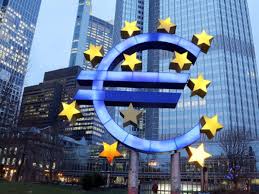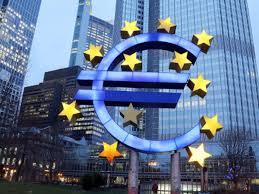
With the aim of restraining euro zone borrowing costs, the European Central Bank could be printing money faster, the central bank signalled on Thursday. The ECB however did not say anything about adding more money to the already robust and aggressive package to tackle the Covid-19 pandemic hit.
The ECB would use its 1.85 trillion Pandemic Emergency Purchase Programme more generously in the next few months in order to prevent any unwarranted rise in debt financing costs, the bank said because it was concerned about the derailment of a recovery across the 19 countries that share the euro due to a rise in bond yields.
"The Governing Council expects purchases under the PEPP over the next quarter to be conducted at a significantly higher pace than during the first months of this year," the ECB said in a statement after its regular policy meeting.
Since the start of this year, there has been a steady rise in yields which prompted the ECB to take this expected measure which was mostly similar to a measure taken by the United States Treasuries instead of reflecting improved economic prospects across the euro zone.
With a new wave of the coronavirus pandemic hitting the European Union and a very slow rollout of the Covid-19 vaccines means longer lockdowns are being needed which has actually resulted in EU growth being weaker than forecast. That threatens to derail; expectations of a rapid rebound in eth EU economy in the spring.
Compared to the US$1.9 trillion pandemic relief package approved by the United States Congress, the fiscal support of the EI has been modest at best.
"The Governing Council will purchase flexibly according to market conditions and with a view to preventing a tightening of financing conditions," the ECB said.
The ECB however stuck with its previous guidance that its PEPP quota will not necessarily be used in full in the vase of favourable market conditions.
Implementing its renewed commitment to favourable financing conditions will be the crucial act for the ECB. It is not possible for the ECB to be micro managing bond yields because that would reduce its options in the future and could be criticised over allegations that it was trying to safe guard governments from market forces.
There is however also caution among policymakers to not overrate rise in yields as those are still below most benchmarks. For example, the German yield curve is still in negative territory up to 20 years and it is the benchmark for the 19-country bloc.
German 10-year yields are only about 30 basis points higher since the start of the year and spreads between German and peripheral bonds are broadly steady.
(Source:www.channelnewsasia.com)
The ECB would use its 1.85 trillion Pandemic Emergency Purchase Programme more generously in the next few months in order to prevent any unwarranted rise in debt financing costs, the bank said because it was concerned about the derailment of a recovery across the 19 countries that share the euro due to a rise in bond yields.
"The Governing Council expects purchases under the PEPP over the next quarter to be conducted at a significantly higher pace than during the first months of this year," the ECB said in a statement after its regular policy meeting.
Since the start of this year, there has been a steady rise in yields which prompted the ECB to take this expected measure which was mostly similar to a measure taken by the United States Treasuries instead of reflecting improved economic prospects across the euro zone.
With a new wave of the coronavirus pandemic hitting the European Union and a very slow rollout of the Covid-19 vaccines means longer lockdowns are being needed which has actually resulted in EU growth being weaker than forecast. That threatens to derail; expectations of a rapid rebound in eth EU economy in the spring.
Compared to the US$1.9 trillion pandemic relief package approved by the United States Congress, the fiscal support of the EI has been modest at best.
"The Governing Council will purchase flexibly according to market conditions and with a view to preventing a tightening of financing conditions," the ECB said.
The ECB however stuck with its previous guidance that its PEPP quota will not necessarily be used in full in the vase of favourable market conditions.
Implementing its renewed commitment to favourable financing conditions will be the crucial act for the ECB. It is not possible for the ECB to be micro managing bond yields because that would reduce its options in the future and could be criticised over allegations that it was trying to safe guard governments from market forces.
There is however also caution among policymakers to not overrate rise in yields as those are still below most benchmarks. For example, the German yield curve is still in negative territory up to 20 years and it is the benchmark for the 19-country bloc.
German 10-year yields are only about 30 basis points higher since the start of the year and spreads between German and peripheral bonds are broadly steady.
(Source:www.channelnewsasia.com)





